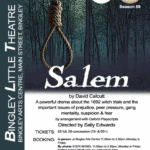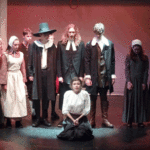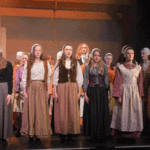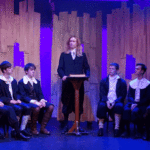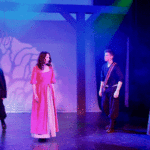Season 69 Kaleidoscope – Salem by David Calcutt
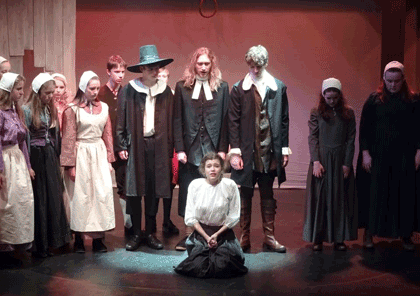
Directed by
Cast
Elizabeth Parris – ALICE MAYNARD
Thomas Putnam – BEN PEARSON
Tituba – LYDIA AITKEN
Mary Warren – DAISY SMITH
Betty Parris – MARTHA EDWARDS
Abigail Williams – DAISY BENSON
Ann Putnam – MATILDA STOTHARD
Mercy Lewis – ALYSSA KEENE
Mary Walcott – SARAH-JANE AKERS
Abigail Hobbs – ELIZABETH JONES
Sarah Good – SARAH PALEY
Dorcas Good – RUBY STEAD
Isaac Easty – OWEN WRAY
Francis Nurse – OLIVER WINDER
Peter Cloyce – IASSAC HARRISON
Joseph Putnam – THEO CONNOLLY
Jonathan Walcott – JACOB LEEMING
Wm Shakespeare – JAMIE TSE
Shakespeare Snr – MATTHEW PERKINS
John Hathorne – SAM PERKINS
Nicholas Noyes – GABE BOWDEN
Jonathan Corwin – ELLIOT MAWSON
Mary Easty – SOPHIE TANKARD
Sarah Cloyce – FRANCESCA MURRAY
Rebecca Nurse – MOLLY INGHAM
Susannah Martin – KATY MCENHILL
John Proctor – DANIEL BURNISTON
Sheriff – SAM CHEWINS & LEO DAVIS
Sheriff’s Assistant – GABRIEL BEAUMONT
Synopsis
In early 1692, Betty Parris and Abigail Williams (the daughter and niece of Samuel Parris, the new Minister) became ill. The girls screamed, contorted their bodies into peculiar positions, uttered strange noises and appeared to hallucinate. The doctor attending them, finding no obvious cause, diagnosed bewitchment. At this time, there was a strong belief in witches and the idea that innocents were possessed by the devil terrified the local community. Rivalries over land, warring tribes, and controversy surrounding the new Minister (who was thought by some to be greedy and of overly-rigid opinions) also contributed to an atmosphere of fear and suspicion which was then attributed to the work of the Devil. A stream of accusations followed, resulting in the public execution of many innocent people. Numerous hypotheses have been put forward as to the cause of the girls’ symptoms; the most convincing being poisoning from ergot fungus (found in wheat, rye and grasses). Many of the people involved in the trials and executions publicly admitted their grave errors and several years later the good names of those accused were restored by a bill passed by the colony with some monetary restitution made to their heirs. However, it took until 1957 for Massachusetts to formally apologise for these horrific events.
Directors Notes
The 2017 Kaleidoscope production turns to a rather more sinister subject than last year’s Nil Desperandum. Many of our audience will be familiar with the subject matter through Arthur Miller’s play, The Crucible, which was partly fictionalised and written as an allegory for McCarthyism in the 1950s. This play however, is based solely on historical fact and is written specifically for a large youth cast to explore the dangers of crowd mentality and the mass hysteria of a community. Despite being based on events over 300 years ago, the themes of irrational fear of strangers and difference, greed and extremism are, unfortunately, still very relevant today – a fact that has certainly not been lost on our cast as we have been preparing for performance. Despite the serious nature of the play, we have enjoyed ourselves in rehearsal and had some interesting discussions along the way.


